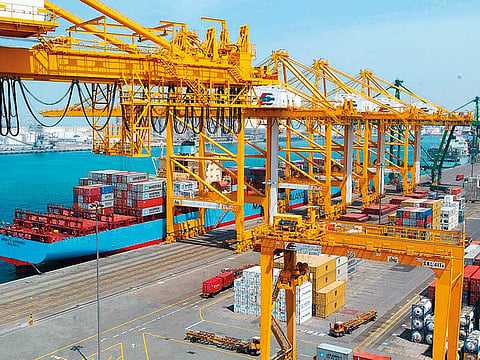Dubai Chamber eyes Latin America, India to boost trade
Chamber to explore business potential in emerging markets including Asia, CIS

Dubai: The Dubai Chamber of Commerce and Industry is aiming to capitalise on economic growth in emerging markets, with plans to open representative offices there to boost trade ties.
The Chamber said it is planning to explore what it describes as “untapped business potential” in markets across Asia, Latin America, Africa, and the CIS (Commonwealth of Independent States) region.
Hamad Bu Amim, president and chief executive officer of the Dubai Chamber, said the organisation will open a representative office in India and another in Argentina before the end of this year. In an email interview with Gulf News, he said that the new offices will explore trade and investment opportunities in these markets in order to boost Dubai’s economy.
As one of the world’s most dynamic and resource-rich regions, Latin America offers plenty of exciting trade and investment opportunities.”
“Our increased focus on Latin America and Asia stems from the widening scope of trade and investment opportunities that are opening up in these markets, as well as the vast business potential that has yet to be explored,” Bu Amim said.
He added that having offices in those markets will also allow the Chamber to find local partners there who can help identify the right business opportunities for companies in Dubai.
The Chamber currently has eight representative offices globally in countries that include China, Brazil, Kenya, Ethiopia, Ghana, Mozambique, Azerbaijan, and the Kurdistan region of Iraq. Non-oil trade between Dubai and all of these markets (excluding Kurdistan) reached Dh49.6 billion during the first quarter of 2017, up 11.5 per cent year-on-year.
India and Latin America
In India, which already has strong economic ties with the UAE, the Chamber believes “there remains a lot of business potential within India’s fast-growing economy that has yet to be explored, especially within the country’s agriculture, pharmaceuticals, and manufacturing sectors.”
In 2016, while most economies around the world struggled with weak oil prices and economic uncertainty, India’s gross domestic product grew at 7.1 per cent, with projections for strong growth in the country’s economy over the coming years.
Non-oil trade between India and Dubai reached $26 billion in 2016, according to figures from the Dubai Chamber.
On the other side of the planet, Latin America is another region of focus for the Chamber, having already opened an office in Sao Paulo earlier this year.
“As one of the world’s most dynamic and resource-rich regions, Latin America offers plenty of exciting trade and investment opportunities. The region is home to the world’s leading agricultural producers and exporters, which means that there is a lot of room for Latin American countries to enhance their collaboration with the UAE on food security,” Bu Amim said.
Meanwhile, UAE business have opportunities to provide Latin American firms with expertise in sectors such as logistics, tourism, and aviation, and invest in infrastructure there.
Emerging markets driving growth
So, why the focus on emerging markets?
“We have seen a shift in global trade patterns over the last year, which have resulted in a lot more economic activity and momentum coming from emerging markets in Asia, Africa, and Latin America.
China’s ambitious One Belt One Road initiative has been a major development that has the potential to transform global trade and establish a New Silk Road that would connect Asia and Europe,” Bu Amim said.
He pointed that Dubai would stand to reap benefits of China’s One Belt initiative as it will provide plenty of trade and investment opportunities over the next decade.
The interest in boosting ties with emerging markets comes after a year marred with uncertainty on the future of world trade as the US eyes protectionist policies and the UK exits the European Union, the world’s largest trading bloc.
Analysts, however, believe global economic growth in 2017 and 2018 will be driven by growth in emerging markets.
According to estimates by the International Monetary Fund (IMF), emerging and developing economies are expected to see growth rates of 4.6 per cent in 2017. This compares to an economic growth rate of 2.1 per cent in the US, and 1.9 per cent in the Euro area.
“Dubai is well-positioned to benefit from an expected recovery in global trade this year, while China and India, the emirate’s top trading partners, will likely remain key drivers of global growth in the near term.
We have also noticed renewed commitment from countries in Asia, Africa, Latin America, and the CIS region to introduce economic reforms, liberalise their trade policies, work towards free trade agreements, and attract more foreign investment,” the Chamber’s CEO said.
Dubai: The Dubai Chamber of Commerce and Industry said it is working to “improve entrepreneurs’ access to financing,” which it described as still being a key challenge for many start-ups in the UAE.
Hamad Bu Amim, president and chief executive officer of the Dubai Chamber, said the organisation is in the process of developing new initiatives that will identify high-potential start-ups and innovative business ideas, and improve access to funds.
“Access to finance remains a key challenge for many start-ups and SMEs (Small and Medium Enterprises), and supply has not kept up with demand in this area,” he said.
The Chamber is also working to increase public-private sector collaboration, and is putting more focus into e-commerce to better assist businesses that want to leverage online channels.
Sign up for the Daily Briefing
Get the latest news and updates straight to your inbox



